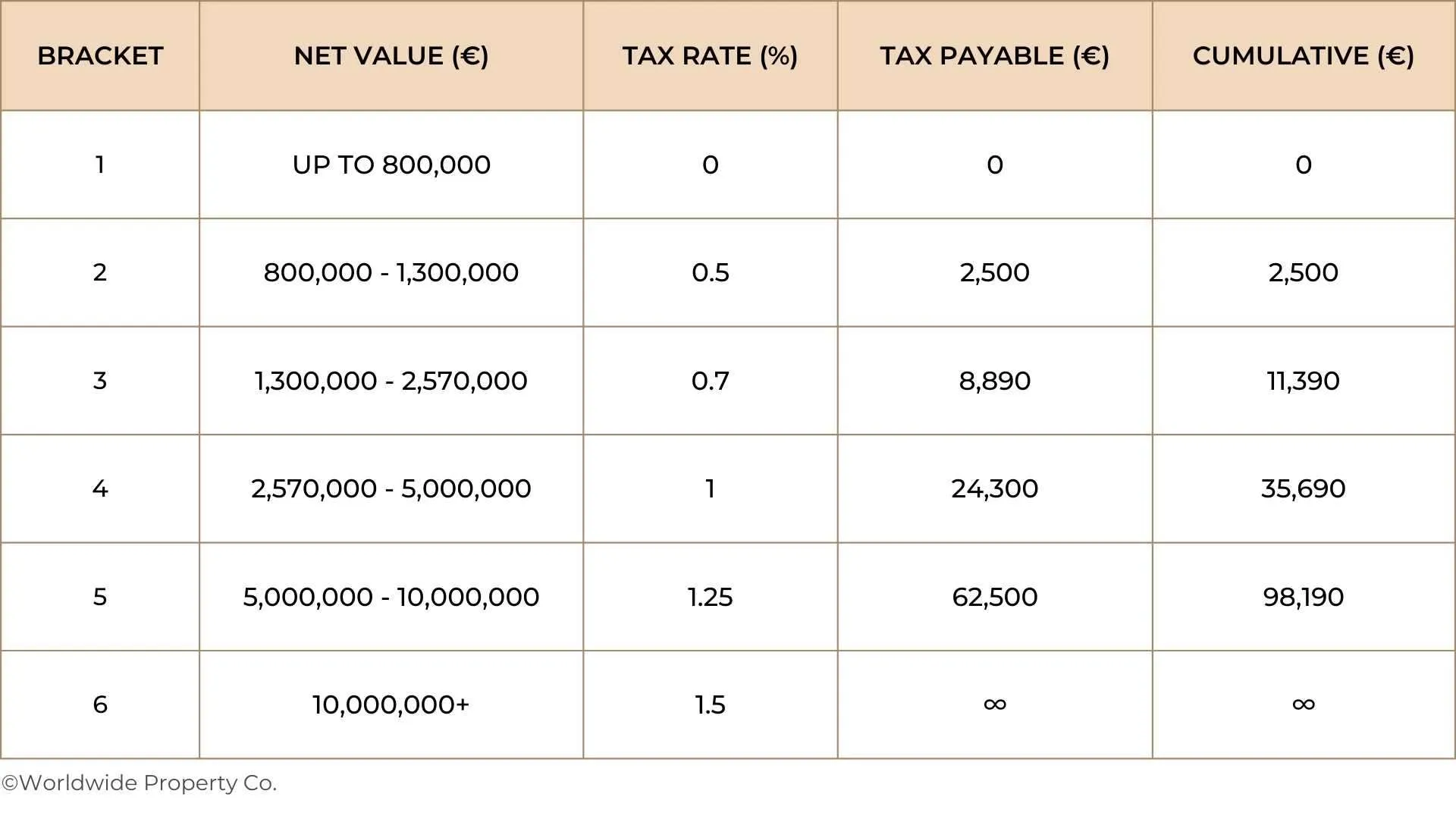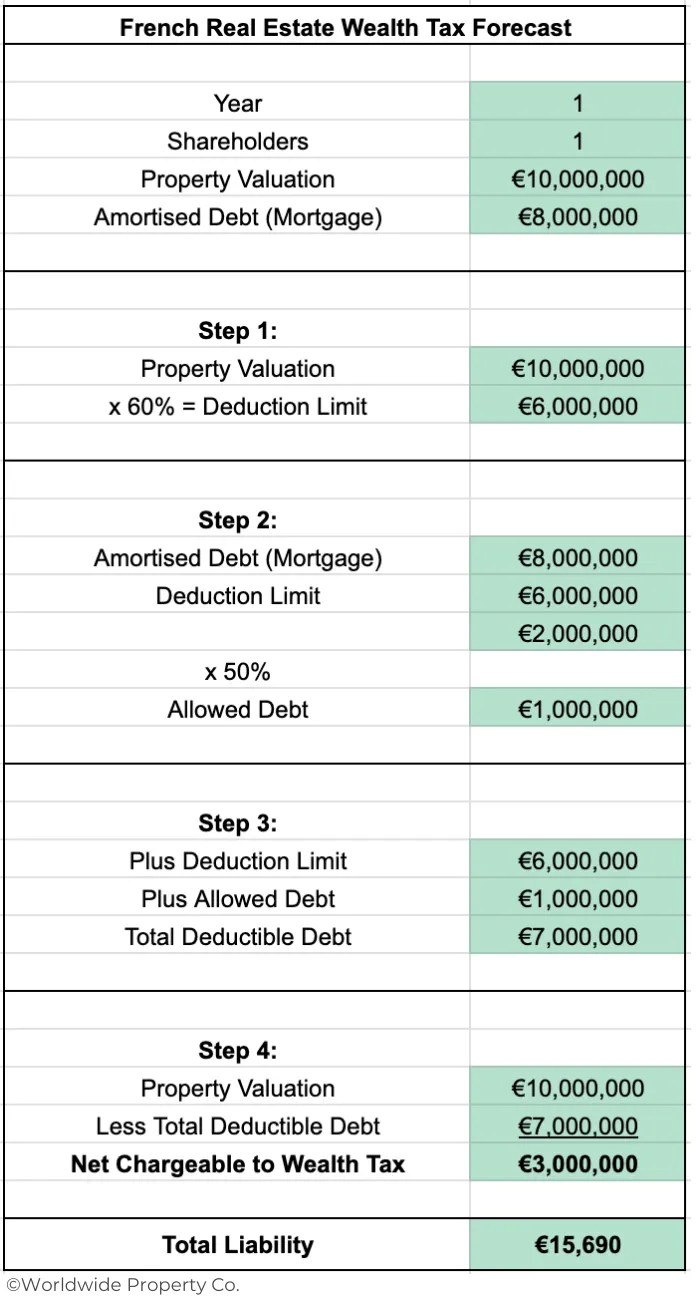The French Wealth Tax (IFI): Essential Guide for Non-Residents (2025)
Welcome to Worldwide Property Co.’s guide to the French Wealth Tax (IFI) for 2025. Designed specifically for foreign buyers navigating the property acquisition process in France, this guide delves into the essential aspects of the French Wealth Tax (IFI), empowering you to make informed decisions and ensure regulatory compliance.
Table of Contents:

Understanding the French Wealth Tax (IFI)
The IFI, also known as the French Real Estate Wealth Tax, levies an annual tax on the net value of real estate assets. Net value is the difference between the current value and any mortgage or loans secured against the property, also known as the equity in the property.
Introduced in 2018 as the successor to the ISF (Solidarity Wealth Tax), it focuses solely on real estate holdings. While officially termed the Real Estate Wealth Tax (Impôt sur la Fortune Immobilière or IFI), it’s commonly referred to as the French Wealth Tax. IFI applies to individuals exceeding a specific net wealth threshold.
Who is Subject to French Wealth Tax? Residents vs. Non-Residents
Non-Residents: You, regardless of your nationality, are liable for IFI if the combined equity of your taxable real estate assets in France surpasses €1.3 million on January 1st of the tax year.
Residents: French residents pay IFI on their worldwide real estate assets. However, a partial exemption for five years applies to individuals relocating to France, covering assets outside France.
Taxable Assets under French Wealth Tax
French Wealth Tax encompasses real estate properties, including houses, apartments, land, and specific real estate-related rights. Notably, the tax applies to the equity of these assets after factoring in deductions and exemptions.
Key points to remember:
- IFI is a household tax, so couples must file a joint declaration.
- Assets held by children below 18 years old must be included.
- French companies you own that hold property must include the underlying property’s value.
- Properties rented for short-term holiday lets, with Para Hotelier may be exempt.
- Commercial properties and buy-to-let investments under LMP status may be exempt under specific conditions.
- Woodlands, rural assets, and specific inheritance situations have exemptions.

Exemptions and Deductions
Several exemptions and deductions can significantly reduce your IFI taxable base, potentially pushing you into a lower tax bracket or even eliminating your tax liability. Here’s a breakdown of key examples:
Primary Residence Exemption:
- Your main residence where you live permanently is fully exempt from IFI. This applies even if the property is located outside France.
- Secondary residences do not qualify for this exemption.
Debt Deductions:
- You can deduct the outstanding principal balance of mortgages or loans used to acquire or improve your taxable real estate assets. This includes mortgages, construction loans, and renovation loans.
- Interest payments on these loans are not deductible.
Professional Assets:
- Professional property used solely for your business activity can be partially or fully exempt, depending on specific conditions. This includes rental property used in schemes such as Para-Hotelier.
- To qualify, the property must be essential for your profession, and your professional income must represent a significant portion of your overall income.
- Rental income generated from the property does not affect its eligibility for exemption.
Exclusions for Specific Properties:
- Forest land managed under specific forestry plans can be partially or fully exempt, depending on the size and management practices.
- Rural assets with low potential yield or those promoting biodiversity may qualify for partial exemptions.
- Protected historical monuments and certain cultural properties can be exempt.
Inheritance-Related Exemptions:
- You may inherit real estate assets with a reduced taxable base under specific conditions, such as inheriting from a spouse or civil partner.
- Gifts of property between certain family members may also benefit from reduced taxation.
Calculating Your French Wealth Tax
The French Wealth Tax rate follows a progressive structure, ranging from 0% to 1.5%, depending on the total net taxable wealth. See our table below for a rate breakdown of this progressive structure:
French Wealth Tax (IFI) Rates for 2025:

Rules for exceeding the €1.3 million threshold:
The tax is not calculated on the entire value exceeding €1.3 million. Each tax bracket applies to a specific portion of the wealth within that bracket.
Example: If your total net taxable assets are €1.5 million, you pay 0.5% on the portion between €800,000 and €1.3 million (€500,000 x 0.5% = €2,500) and 0.7% on the remaining €200,000 (€200,000 x 0.7% = €1,400). Leaving you a total of €3,900 of payable tax.
French Properties Worth More Than €5m:
For properties that are liable to the French Real Estate Wealth Tax (IFI) and are valued at more than €5m, there is a reduction in the amount of debt that can be used to reduce the liability to the wealth tax.

This is calculated in 4 steps:
Step 1
Purchase Price x 60% = Deduction Limit.
Step 2
If the mortgage amount is greater than x, then divide the difference between the Deduction Limit and the mortgage amount in half = Allowed Debt.
Step 3
Deduction Limit + Allowed Debt = Total Deductible Debt
Step 4:
Property Valuation – Total Deductible Debt = Net Equity Chargeable to Wealth Tax
Declaration and Payment
You must declare your IFI liability with your income tax return or using a specific form by June 1st of the tax year. Payment is due in November following the declaration.
Additional Resources:
French tax authorities website: https://www.impots.gouv.fr/accueil
Personalised Guidance and Assistance: Worldwide Property Co
For personalised guidance and assistance with sourcing real estate and securing mortgages abroad, navigating French property transactions, and understanding tax implications, contact Worldwide Property Co. your trusted buyer’s agent and mortgage brokerage specialising in international property transactions. We are committed to empowering you to make informed decisions and achieve your property investment goals.
Contact us today and book your free consultation with one of our French mortgage specialists.

Disclaimer: This guide is offered for informational purposes only and should not be construed as legal or tax advice. Tax laws and regulations are subject to change, and it’s highly recommended to seek professional advice regarding your specific tax situation.
